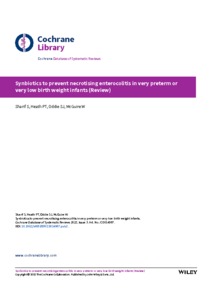Sharif, S; Heath, PT; Oddie, SJ; McGuire, W
(2022)
Synbiotics to prevent necrotising enterocolitis in very preterm or very low birth weight infants.
Cochrane Database Syst Rev, 3.
CD014067.
ISSN 1469-493X
https://doi.org/10.1002/14651858.CD014067.pub2
SGUL Authors: Heath, Paul Trafford
![[img]](https://openaccess.sgul.ac.uk/114179/1.hassmallThumbnailVersion/Sharif_et_al-2022-Cochrane_Database_of_Systematic_Reviews.pdf)  Preview |
|
PDF
Published Version
Available under License ["licenses_description_publisher" not defined].
Download (490kB)
| Preview
|
Abstract
BACKGROUND: Intestinal dysbiosis may contribute to the pathogenesis of necrotising enterocolitis (NEC) in very preterm or very low birth weight (VLBW) infants. Dietary supplementation with synbiotics (probiotic micro-organisms combined with prebiotic oligosaccharides) to modulate the intestinal microbiome has been proposed as a strategy to reduce the risk of NEC and associated mortality and morbidity. OBJECTIVES: To assess the effect of enteral supplementation with synbiotics (versus placebo or no treatment, or versus probiotics or prebiotics alone) for preventing NEC and associated morbidity and mortality in very preterm or VLBW infants. SEARCH METHODS: We searched the Cochrane Central Register of Controlled Trials, MEDLINE, Embase, the Maternity and Infant Care database and CINAHL, from earliest records to 17 June 2021. We searched clinical trials databases and conference proceedings, and examined the reference lists of retrieved articles. SELECTION CRITERIA: We included randomised controlled trials (RCTs) and quasi-RCTs comparing prophylactic synbiotics supplementation with placebo or no synbiotics in very preterm (< 32 weeks' gestation) or very low birth weight (< 1500 g) infants. DATA COLLECTION AND ANALYSIS: Two review authors separately performed the screening and selection process, evaluated risk of bias of the trials, extracted data, and synthesised effect estimates using risk ratio (RR), risk difference (RD), and mean difference, with associated 95% confidence intervals (CIs). We used the GRADE approach to assess the level of certainty for effects on NEC, all-cause mortality, late-onset invasive infection, and neurodevelopmental impairment. MAIN RESULTS: We included six trials in which a total of 925 infants participated. Most trials were small (median sample size 200). Lack of clarity on methods used to conceal allocation and mask caregivers or investigators were potential sources of bias in four of the trials. The studied synbiotics preparations contained lactobacilli or bifidobacteria (or both) combined with fructo- or galacto-oligosaccharides (or both). Meta-analyses suggested that synbiotics may reduce the risk of NEC (RR 0.18, 95% CI 0.09 to 0.40; RD 70 fewer per 1000, 95% CI 100 fewer to 40 fewer; number needed to treat for an additional beneficial outcome (NNTB) 14, 95% CI 10 to 25; six trials (907 infants); low certainty evidence); and all-cause mortality prior to hospital discharge (RR 0.53, 95% CI 0.33 to 0.85; RD 50 fewer per 1000, 95% CI 120 fewer to 100 fewer; NNTB 20, 95% CI 8 to 100; six trials (925 infants); low-certainty evidence). Synbiotics may have little or no effect on late-onset invasive infection, but the evidence is very uncertain (RR 0.84, 95% CI 0.58 to 1.21; RD 20 fewer per 1000, 95% CI 70 fewer to 30 more; five trials (707 infants); very low-certainty evidence). None of the trials assessed neurodevelopmental outcomes. In the absence of high levels of heterogeneity, we did not undertake any subgroup analysis (including the type of feeding). AUTHORS' CONCLUSIONS: The available trial data provide only low-certainty evidence about the effects of synbiotics on the risk of NEC and associated morbidity and mortality for very preterm or very low birth weight infants. Our confidence in the effect estimates is limited; the true effects may be substantially different from these estimates. Large, high-quality trials would be needed to provide evidence of sufficient validity and applicability to inform policy and practice.
| Item Type: |
Article
|
| Additional Information: |
Copyright © 2022 The Cochrane Collaboration. Published by John Wiley & Sons, Ltd. This review is published as a Cochrane Review in the Cochrane Database of Systematic Reviews 2022, Issue 3. Cochrane Reviews are regularly updated as new evidence emerges and in response to comments and criticisms, and the Cochrane Database of Systematic Reviews should be consulted for the most recent version of the Review. Sharif S, Heath PT, Oddie SJ, McGuire W. Synbiotics to prevent necrotising enterocolitis in very preterm or very low birth weight infants. Cochrane Database of Systematic Reviews 2022, Issue 3. Art. No.: CD014067. DOI: 10.1002/14651858.CD014067.pub2. |
| Keywords: |
General & Internal Medicine, 11 Medical and Health Sciences |
| SGUL Research Institute / Research Centre: |
Academic Structure > Infection and Immunity Research Institute (INII) |
| Journal or Publication Title: |
Cochrane Database Syst Rev |
| ISSN: |
1469-493X |
| Language: |
eng |
| Publisher License: |
Publisher's own licence |
| Projects: |
|
| PubMed ID: |
35230697 |
| Dates: |
| Date |
Event |
| 2022-03-01 |
Published |
| 2022-01-05 |
Accepted |
|
 |
Go to PubMed abstract |
| URI: |
https://openaccess.sgul.ac.uk/id/eprint/114179 |
| Publisher's version: |
https://doi.org/10.1002/14651858.CD014067.pub2 |
Statistics
Item downloaded times since 10 Mar 2022.
Actions (login required)
 |
Edit Item |



